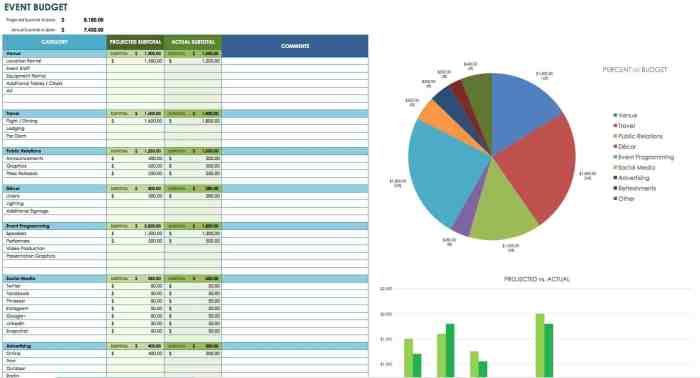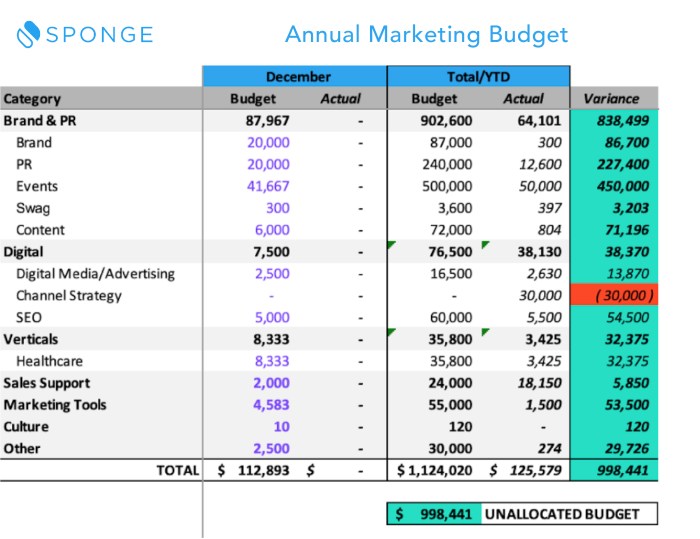Developing a Marketing Budget is not just about numbers; it’s about creating a roadmap to achieve your business goals through strategic allocation of resources and funds.
From understanding the importance of budgeting to implementing effective strategies, this process can make or break your marketing success.
Importance of Developing a Marketing Budget
Having a marketing budget is crucial for businesses to effectively allocate resources and achieve their marketing goals. It provides a clear roadmap for investing in promotional activities and helps in measuring the success of marketing campaigns.
Benefits of Setting a Clear Budget for Marketing Activities, Developing a Marketing Budget
- Ensures financial discipline and prevents overspending.
- Allows for strategic planning and prioritization of marketing initiatives.
- Helps in tracking ROI and optimizing marketing efforts for better results.
How a Well-Planned Budget Contributes to Achieving Marketing Goals
- Provides a framework for aligning marketing strategies with business objectives.
- Enables better decision-making by evaluating the effectiveness of different marketing channels.
- Allows for adjustments and reallocation of resources based on performance data.
Examples of Successful Companies that Prioritize Marketing Budgets
- Apple: Known for its innovative marketing campaigns with a significant budget allocation.
- Coca-Cola: Invests heavily in marketing to maintain brand visibility and customer engagement.
- Procter & Gamble: Strategically plans marketing budgets for each product category to maximize impact.
Factors to Consider When Developing a Marketing Budget

When developing a marketing budget, several key factors come into play that influence how funds are allocated. Market research, industry trends, and balancing short-term and long-term considerations all play a crucial role in determining the size and distribution of the budget.
Role of Market Research
Market research is essential in determining the budget size as it provides valuable insights into target audiences, competition, and overall market conditions. By understanding consumer preferences and behaviors, companies can allocate funds more effectively to reach their target market and achieve their marketing goals.
Impact of Industry Trends
Industry trends have a significant impact on budget planning as they dictate the strategies and channels that are most effective in reaching consumers. By staying up-to-date with industry trends, companies can ensure that their marketing budget is allocated towards initiatives that will yield the best results and keep them competitive in the market.
Balancing Short-term and Long-term Considerations
It is important to strike a balance between short-term and long-term budget considerations when developing a marketing budget. While short-term initiatives may generate immediate results, long-term investments in branding and customer loyalty can provide sustainable growth over time. By finding the right balance, companies can ensure that their marketing budget is optimized for both immediate impact and long-term success.
Strategies for Setting a Marketing Budget
Setting a marketing budget requires careful planning and consideration to ensure the success of your marketing campaigns. Here are some key strategies to help you set an effective marketing budget:
Different Approaches to Setting a Marketing Budget
When it comes to setting a marketing budget, there are several approaches you can take:
- Percentage of Revenue: Allocate a certain percentage of your revenue towards marketing efforts. This approach ensures that your budget scales with your business’s financial performance.
- Competitive Parity: Set your budget based on what your competitors are spending on marketing. This approach helps you stay competitive in the market.
- Objective-Based: Align your budget with specific marketing objectives, such as increasing brand awareness or driving sales. This approach ensures that your budget is tied to measurable goals.
Aligning the Budget with the Overall Marketing Strategy
It’s crucial to align your marketing budget with your overall marketing strategy to maximize its effectiveness. Ensure that your budget supports your marketing goals and targets the right audience. By aligning the budget with the strategy, you can allocate resources efficiently and achieve better results.
Adjusting the Budget Based on Campaign Performance
Monitoring your campaign performance is essential for making informed budget adjustments. Analyze key metrics such as ROI, conversion rates, and customer acquisition costs to determine the effectiveness of your campaigns. If a campaign is underperforming, consider reallocating funds to more successful initiatives to optimize your budget allocation.
Tracking ROI and Adjusting the Budget Accordingly
Tracking ROI is essential for evaluating the success of your marketing efforts and making data-driven decisions. By measuring the return on investment for each campaign, you can identify high-performing strategies and allocate resources more effectively. Adjust your budget based on ROI analysis to ensure that you are maximizing the impact of your marketing budget.
Allocation of Funds in a Marketing Budget: Developing A Marketing Budget

When it comes to allocating funds in a marketing budget, it’s crucial to understand where your money is going and how it aligns with your overall marketing goals.
Breakdown of Expenses
- Advertising: This includes paid ads on various platforms such as social media, search engines, and traditional media like TV and radio.
- Public Relations (PR): Expenses related to building and maintaining a positive public image through media relations, press releases, and events.
- Digital Marketing: Costs associated with online marketing efforts like email campaigns, content creation, , and social media management.
Importance of Prioritizing Budget Allocation
- Target Audience: Allocating more funds to channels where your target audience is most active can lead to higher engagement and conversion rates.
- ROI: Prioritizing budget allocation based on the channels that provide the highest return on investment ensures optimal use of resources.
Effective Allocation Strategies
- Segmentation: Divide your target audience into segments and allocate funds based on the preferences and behaviors of each segment.
- A/B Testing: Experiment with different budget allocations across channels to determine the most effective combination for reaching your goals.
Optimizing Budget Allocation
- Track Performance: Regularly monitor and analyze the performance of each channel to identify areas where adjustments in budget allocation are needed.
- Iterate and Improve: Continuously refine your budget allocation strategy based on data and insights to maximize the impact of your marketing efforts.





